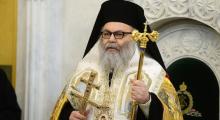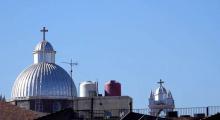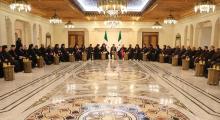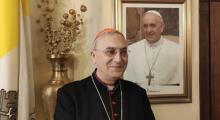Issued by the Catholic Center for Studies and Media - Jordan. Editor-in-chief Fr. Rif'at Bader - موقع أبونا abouna.org
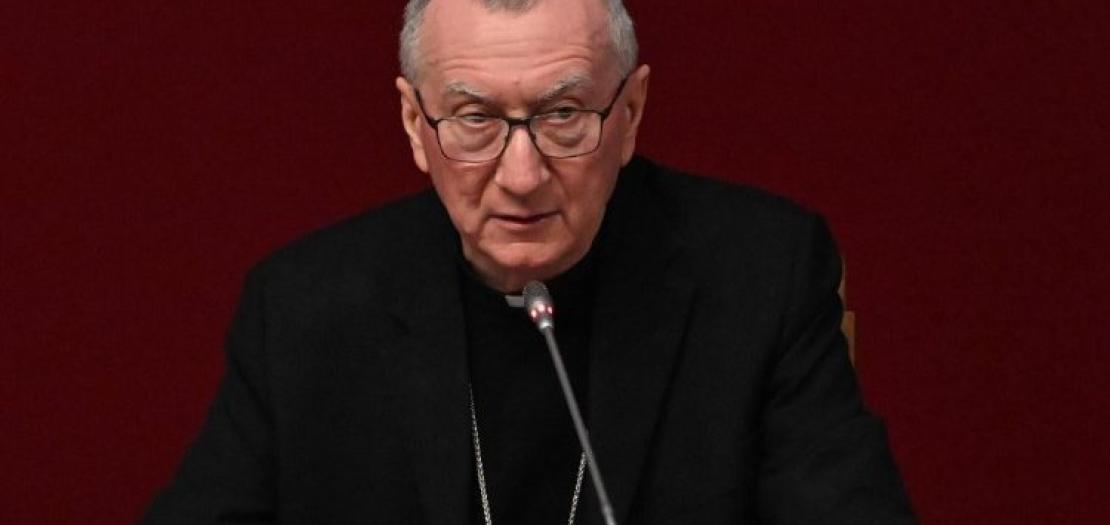
Cardinal Secretary of State Pietro Parolin will head up the Holy See’s delegation to COP28, the United Nations Climate Change Conference taking place in Dubai, United Arab Emirates.
The delegation is scheduled to arrive Friday, 1 December, the same day Pope Francis was due to travel to the Conference. On the advice of his doctors, the Pope, who has been suffering from inflammation of the lungs, cancelled his trip “with great regret” to avoid aggravating his condition.
Q: Your Eminence, the Pope will not be able to attend the international climate conference in Dubai as he would have wished. What are Francis’ expectations and hopes for COP28?
The Pope has at heart the awareness of the need to act for the care of the common home, the urgency of courageous positions, and a new impetus towards local and international policies so that humanity is not threatened by partisan, short-sighted, or predatory interests. COP28 is called upon to give a clear response from the political community to confront this climate crisis with determination in the urgent timeframe indicated by science.
The Pope was not able to go to Dubai, but the decision to be there, the first time for a Pope, emerged clearly from Laudate Deum, in which he recalls that it is now eight years since the publication of the Encyclical Letter Laudato sí, in which he wished to share with everyone the suffering of the planet and the “heartfelt concerns” for the care of the common home. The Pope explains that “with the passage of time […] our responses have not been adequate, while the world in which we live is collapsing and may be nearing the breaking point” (LD, 2).
Not only do scientific studies highlight the serious impacts of climate change produced by anthropogenic behaviour, but it is now a daily occurrence to witness extreme natural phenomena around the world, which severely affect the quality of life of a large part of the human population, and, in particular, the component most vulnerable to the climate crisis that has been the least responsible in provoking it.
Q: The Holy Father has repeatedly invoked the word "courage," asking governments for policies for an integral ecology to protect humanity and our common home. What are the expectations for COP28?
Here too, Laudate Deum is very clear: “If we are confident in the capacity of human beings to transcend their petty interests and to think in bigger terms, we can keep hoping that COP28 will allow for a decisive acceleration of energy transition, with effective commitments subject to ongoing monitoring. This Conference can represent a change of direction, showing that everything done since 1992 was in fact serious and worth the effort, or else it will be a great disappointment and jeopardize whatever good has been achieved thus far” (n. 54).
Indeed, the hope is that COP28 can give clear indications to encourage this acceleration. An energy transition that can be developed in various ways, starting from the gradual and rapid reduction of fossil fuels through a greater use of renewable energies and energy efficiency, as well as through a greater commitment to education for integral ecology.
Indeed, it is good to reiterate what the Holy Father and the Holy See have often repeated: Economic and technical means to counter the climate crisis are necessary but not sufficient; it is essential that they be accompanied by an educational process that influences changes in lifestyles and means of production and consumption, aimed at promoting a renewed model of integral human development and sustainability based on care, fraternity, cooperation between human beings and the strengthening of that alliance between human beings and the environment which, as Benedict XVI said in Caritas in veritate, “should mirror the creative love of God, from whom we come and towards whom we are journeying”.
Q: The Pope reiterated that after the Paris conference in 2015, there was, in fact, a decline, a loss of interest. Your Eminence, you have followed these events closely. Does the world realize the dangers?
The climate crisis is very complex, but it is “a global social issue and one intimately related to the dignity of human life” (LD, no. 3). It is, moreover, linked to human behaviour of increasing greenhouse gas emissions that have long-term consequences. They date back to the post-industrial revolution period of the late 18th century but have strongly increased over time. As indicated by the IPCC, the UN scientific body that studies climate change, more than 42 per cent of total net emissions since 1850 occurred after 1990. These are timeframes that go far beyond the short election cycles politicians have to answer to. This is certainly a primary concern.
In addition, since 2015, there have been a series of crises—just think of Covid, or the persistent humanitarian issues that pervade our society. The conflicts in Ukraine and in the Israeli-Palestinian area are just two striking examples of how localised conflicts not only have an unacceptable and devastating impact on local civilian populations, but also have profound economic and social repercussions worldwide. Here is a second concern: these crises risk diverting the international community’s attention from the climate issue.
Unfortunately, climate change is moving forward and is not waiting for human “goodwill” to be implemented. What is needed is for the international community not only to take note of this but to realize concretely that in order to combat the climate crisis, we either win together or lose together.
At COP26 in Glasgow, the Holy Father sent a Message in which he indicated that “the wounds inflicted on our human family by […] the phenomenon of climate change are comparable to those resulting from a global conflict. Today, as in the aftermath of the Second World War, the international community as a whole needs to set as a priority the implementation of collegial, solidary, and farsighted actions.” The real enemy to be fought is irresponsible behaviour that has repercussions on all the components of our humanity today and tomorrow. The response must be swift and cohesive.
It would be good if COP28 would help to put into practice the desire expressed by Pope Francis in Laudato sí: “Although the post-industrial period may well be remembered as one of the most irresponsible in history, nonetheless there is reason to hope that humanity at the dawn of the twenty-first century will be remembered for having generously shouldered its grave responsibilities” (no. 165). There is hope in this, since humanity possesses the means and capabilities to be able to assume such responsibilities.
Q: COP28 is taking place in the United Arab Emirates, while the conflict between Israel and Hamas is ongoing. How does the Holy See view this situation?
The terrorist attack perpetrated on 7 October by Hamas and other Palestinian organisations against the population in Israel has caused a serious and deep wound in Israelis and in all of us. The security of that population was seriously jeopardised in such a brutal manner and incredibly in such a short time. The Holy Father said it right from the start: “Terrorism and extremism do not help reach a solution to the conflict between Israelis and Palestinians, but fuel hatred, violence and revenge, and only cause suffering to both”.
And indeed, the Israeli-Palestinian peace process, which was already suffering slowdowns and stagnation, has now become even more complex. On the other hand, perhaps this was the aim of the terrorists since, as they have always declared, the Hamas militants don’t have peace with Israel on their horizon; on the contrary, irresponsibly, they would desire its disappearance.
This, however, does not correspond to the desire that the Authority of the State of Palestine, in particular President Mahmoud Abbas, has always assured us of, that is, of wanting a dialogue with the State of Israel for a full realisation of the two-state solution, promoted for so many years by the Holy See together, with a special statute for the Holy City of Jerusalem.
This is why I hope that in the future there will be sincere paths of dialogue, even if I see them now as very restricted. In the Vatican Gardens, there is that olive tree that was planted in 2014 by Israeli President Shimon Peres and Palestinian President Mahmoud Abbas, together with Pope Francis and Patriarch Bartholomew. We continue to water it with the water of hope, which flows from prayer and also from diplomatic work.
However, these days, we have seen a glimmer of light in the negotiations that allowed for a truce and the release of several Israeli and other hostages. Unfortunately, today we have learned that fighting has resumed. The Holy See hopes that all violence will cease as soon as possible.
I believe that the dialogue efforts made by Egypt and Qatar, together with the United States of America, are truly to be commended, along with the willingness of the Israeli government to reach a solution for all hostages as soon as possible. I am truly happy to see those people being able to re-embrace their families. I also pray for and sympathise with the anguish of the other families who are still unable to embrace their loved ones, still being held in Gaza. We hope that they will all be released soon.
At the same time, the humanitarian situation in the Gaza Strip is a source of great concern for the Holy See. Thousands of victims—we are talking over 15,000 injured and missing. It seems that there is nowhere safe; even schools, hospitals, and places of worship are being misused and fought over. More than a million people are homeless, having to move to the south of that small strip of Palestinian land.
The role of Egypt, which is providing and coordinating the arrival of humanitarian aid, is truly commendable, as is that of Jordan, Qatar, and the United Arab Emirates, who are sending it and trying to help the Palestinian population. We cannot forget, and we encourage the humanitarian effort that the UN agencies are making in Gaza.
It is now necessary for the fighting to cease definitively and for other ways to be found for Hamas and other Palestinian organizations to disarm and no longer be a terrorist threat to the Israelis, but also to the Palestinians themselves.
As the Holy Father has already said, this conflict, touching the Holy Land, touches the hearts and emotions of everyone. One feels very much the anger of so many for what happened on 7 October in Israel, but also for what is happening in Gaza, and now for the horrible consequences that this conflict is producing in the societies of some countries. I refer in particular to the growing number of acts of anti-Semitism that have occurred in many countries.
As the Holy Father has said many times and with great determination, anti-Semitism is a denial of one's origins, an absolute contradiction, because a Christian cannot be anti-Semitic. Our roots are common. It would be a contradiction of faith and life. And not only for Christians; for everyone, defending the freedom of others in professing their faith is a human act, whereas outraging it is inhuman, as happened in the shameful Shoah.
Q: The Holy See also continues to closely follow the war between Russia and Ukraine. How is the work of Vatican diplomacy continuing in this context?
The Holy See's commitment remains unaltered and continues to focus on humanitarian issues, in particular the repatriation of Ukrainian minors. The various exchanges of information between the Ukrainian and Russian sides, through the Apostolic Nunciatures present in the two countries, have made it possible to ascertain the fate of dozens of children.
An encouraging outcome, achieved also thanks to the explicit involvement of the Holy See, as noted by the Office of the Presidential Commissioner for the Rights of the Child of the Russian Federation, was the repatriation of Bogdan Yermokhin, which took place the evening before he turned 18.
Moreover, the mechanism initiated following Cardinal Zuppi's mission is being refined, promising better results. We hope that this effort will open the way for dialogue on other issues as well.
Q: Your Eminence, is hope still worth having in these complex times torn by war, violence, and deprivation?
In the face of the tragedies that continue to afflict humanity, we all feel like losers, and we are tempted to give in to despair and fatalism. With Pope Francis, I, too, want to repeat, “Let us not allow our hope to be stolen from us,” especially when life's journey comes up against problems and obstacles that seem insurmountable.
Of course, hope demands realism. It demands that we call problems by name, in the knowledge that the many moral, social, environmental, political, and economic crises we are experiencing are interconnected, and what we see as individual problems are actually a cause or consequence of the other.
But hoping also demands the courage to act—the audacity to throw one’s heart over the obstacle, to renounce evil and step out of the narrow space of personal or national interests, to take those small possible steps of good every day to try to improve complicated situations and sow peace with patience and trust.




